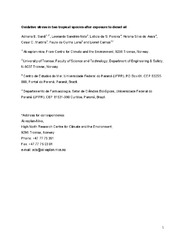| dc.contributor.author | Sardi Sulvarán, Adriana Eva | |
| dc.contributor.author | Sandrini-Neto, Leonardo | |
| dc.contributor.author | da S. Pereira, Leticia | |
| dc.contributor.author | Silva de Assis, Helena | |
| dc.contributor.author | Martins, Cesar C. | |
| dc.contributor.author | Lana, Paulo Da Cunha | |
| dc.contributor.author | Camus, Lionel | |
| dc.date.accessioned | 2017-03-21T16:53:00Z | |
| dc.date.available | 2017-03-21T16:53:00Z | |
| dc.date.issued | 2016-08-03 | |
| dc.description.abstract | Recent offshore petroleum exploration has increased the risks of oil spills worldwide. We investigated biomarker responses to diesel oil exposure in two tropical and subtropical species, the clam Anomalocardia flexuosa and the polychaete Laeonereis culveri. Animals were exposed to oil-spiked sediment at two different concentrations (0.5 L and 1.0 L m−2). Activities of antioxidant enzymes catalase (CAT), superoxide dismutase (SOD), and glutathione peroxidase (GPx); glutathione transferase (GST); and lipid peroxides (LPO) were assessed in bivalve digestive glands and polychaete whole-body homogenates at 36 and 60 h of exposure. Significant variation in enzymatic antioxidant activity depended on the sampling time after exposure. No similar response patterns, either increases or decreases, were detected for the two target species, and biomarker responses were species-specific. L. culveri showed clearer patterns in its antioxidant response and should be prioritized over other species in biomonitoring studies involving oil exposure. Understanding the temporal variability of these biomarkers is a necessary action before implementing them as indicators measures in oil contamination biomonitoring programs. Our results provide a better understanding of biomarker responses in subtropical species, evidencing their potential use as sentinels of oil contamination. | en_US |
| dc.description.sponsorship | This study was funded by the “Latin Amerika” research program of the Norwegian Research Council, attributed to Akvaplan-niva under the Project number 227180/H30. C.C. Martins wishes to thank CNPq (Brazilian National Council for Scientific and Technological Development) for a research grant (448945/2014-2) | en_US |
| dc.description | Link to publishers version: 10.1007/s11356-016-7280-2 | en_US |
| dc.identifier.citation | Sardi Sulvarán AE, Sandrini-Neto, da S. Pereira, Silva de Assis, Martins, Lana, Camus L. Oxidative stress in two tropical species after exposure to diesel oil. Environmental science and pollution research international. 2016; 23; (20) 20952-20962 | en_US |
| dc.identifier.cristinID | FRIDAID 1387176 | |
| dc.identifier.doi | 10.1007/s11356-016-7280-2 | |
| dc.identifier.issn | 0944-1344 | |
| dc.identifier.issn | 1614-7499 | |
| dc.identifier.uri | https://hdl.handle.net/10037/10812 | |
| dc.language.iso | eng | en_US |
| dc.relation.journal | Environmental science and pollution research international | |
| dc.rights.accessRights | openAccess | en_US |
| dc.subject | VDP::Agriculture and fishery disciplines: 900 | en_US |
| dc.subject | VDP::Mathematics and natural science: 400 | en_US |
| dc.title | Oxidative stress in two tropical species after exposure to diesel oil | en_US |
| dc.type | Peer reviewed | en_US |
| dc.type | Journal article | |
| dc.type | Tidsskriftsartikkel | |


 English
English norsk
norsk